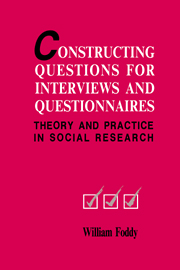Book contents
- Frontmatter
- Contents
- Tables
- Figures
- Preface
- Chapter 1 An initial statement of the problem
- Chapter 2 A theoretical framework
- Chapter 3 Defining topics properly
- Chapter 4 Formulating intelligible requests for information
- Chapter 5 Contextual influences on respondents' interpretations of questions
- Chapter 6 The need to provide response frameworks
- Chapter 7 The limitations of human memory
- Chapter 8 Filters: establishing the relevance of questions to respondents
- Chapter 9 Reducing question threat
- Chapter 10 The open vs. closed questions debate
- Chapter 11 Measuring attitudes
- Chapter 12 Checks to ensure that questions work as intended
- Chapter 13 Concluding comments
- The tap paradigm
- References
- Index
- Acknowledgements
Chapter 8 - Filters: establishing the relevance of questions to respondents
Published online by Cambridge University Press: 04 September 2009
- Frontmatter
- Contents
- Tables
- Figures
- Preface
- Chapter 1 An initial statement of the problem
- Chapter 2 A theoretical framework
- Chapter 3 Defining topics properly
- Chapter 4 Formulating intelligible requests for information
- Chapter 5 Contextual influences on respondents' interpretations of questions
- Chapter 6 The need to provide response frameworks
- Chapter 7 The limitations of human memory
- Chapter 8 Filters: establishing the relevance of questions to respondents
- Chapter 9 Reducing question threat
- Chapter 10 The open vs. closed questions debate
- Chapter 11 Measuring attitudes
- Chapter 12 Checks to ensure that questions work as intended
- Chapter 13 Concluding comments
- The tap paradigm
- References
- Index
- Acknowledgements
Summary
Social researchers tend to assume high levels of opinionatedness on the part of respondents, so that little attention is paid to establishing whether or not respondents actually have had the necessary experience upon which an assumed opinion or belief could be based. This is a problem because it has been found that one cannot rely on respondents to indicate when questions are of marginal relevance to them. Respondents typically do their best to answer every question put to them — even questions that they have difficulty understanding or relating to — either by cognitively adjusting the question so they can answer it or by falling back on contextual clues and general attitudes to formulate an appropriate answer (see, e.g., Schuman and Presser, 1980; Bishop et al, 1980; Belson, 1981; Strack and Martin, 1987).
A question or question component that is explicitly offered to a respondent, either to establish the relevance of the question to the respondent, or to emphasise that it is acceptable for the respondent to not answer the question, is generally referred to as a ‘filter’. A variety of filters have been invented ranging from the simple ‘Don't know’, ‘Can't recall’ and ‘No opinion’ response options, through the ‘Undecided’, ‘Not sure’, ‘It depends’ and ‘Neutral’ alternatives, to sets of questions that attempt to establish the extent to which an opinion or belief is based on experience of or knowledge about the topic.
- Type
- Chapter
- Information
- Constructing Questions for Interviews and QuestionnairesTheory and Practice in Social Research, pp. 101 - 111Publisher: Cambridge University PressPrint publication year: 1993



